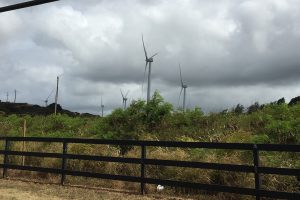8 October 2019: The tenth International Forum on Energy for Sustainable Development discussed opportunities to support progress on SDG 7 (affordable and clean energy) and SDG 13 (climate action) across the Asia-Pacific region. Participants shared their experiences with SDG 7 implementation, and considered opportunities and barriers to achieving an energy transition in the region.
The UN Economic Commission for Europe (UNECE), UN Economic Commission for Latin America (ECLAC), UN Economic Commission for Africa (UNECA), UN Economic and Social Commission for Western Asia (UNESCWA) and the Thailand Ministry of Energy organized the two-day Forum, which focused on the theme, ‘Translating Targets into Actions.’ The Forum took place as part of Asia-Pacific Energy Week, a series of high-level events on sustainable energy, including the Second Session of the ESCAP Committee on Energy.
In her opening remarks, ESCAP Executive Secretary, Armida Alisjahbana, said achieving SDG 7 will “require a radical transition in many areas,” including how the world sources and consumes energy, and stressed that the region needs a “four-fold increase in energy investment between now and 2020” to achieve SDG 7. She said the full costs of air pollution must be considered in decisions on fuel and technologies to ensure clean water and healthy cities. Alisjahbana called for deeper regional cooperation and integration to extend renewable energy-based grids, and shared ESCAP’s efforts to support member States in implementing SDG 7, including through the development of roadmaps for energy connectivity.
The private sector brings skills needed to push SDG 7 into reality.
Thailand’s Minister of Energy, Sontirat Sontijirawong, highlighted the critical role of the private sector in implementing sustainable energy targets, saying they “bring skills needed to push SDG 7 into reality.” He said Thailand’s Ministry of Energy has launched several financial incentive schemes to boost private sector investment in energy efficiency and renewable energy. Indonesia’s Minister of National Development Planning, Bambang Brodjonegoro, said although access to energy varies across the region, all Asia-Pacific countries face a challenge in “providing affordable energy to the people, while ensuring it is sustainable for the long-term.” To address this challenge, he said Indonesia has introduced a low-carbon development initiative to support the country’s next five-year medium-term development planning.
A high-level panel discussed how to address the interlinkages between energy, and climate change, poverty, health, gender and inequality concerns. Participants recognized that progress in sustainable energy depends on and can support efforts to eradicate poverty, advance health and education, reduce inequalities and contribute to efforts to leave no one behind. They further highlighted the potential of sustainable energy in achieving gender balance, such as though increased access to medical services and education, improved energy access for women and additional job opportunities.
On the Forum sidelines, ESCAP launched the Asia-Pacific Network of Energy Think Tanks (APNETT). The Network will convene energy expertise from across disciplines and organizations to exchange knowledge and support collaborative research on sustainable energy development. ESCAP and Energy Foundation China held a meeting for a joint project on low-carbon and green development in the Asia-Pacific region. The project will develop a national Expert SDG Tool for Energy Planning (NEXSTEP) to help developing countries plan for SDG 7 implementation, among other activities. Alisjahbana said NEXSTEP will support the development of national SDG roadmaps and “enable policymakers to make informed policy decisions to support achievement of SDG 7 and emission reduction targets.” [ESCAP Press Release] [ESCAP Executive Secretary Opening Statement] [Forum Webpage]

